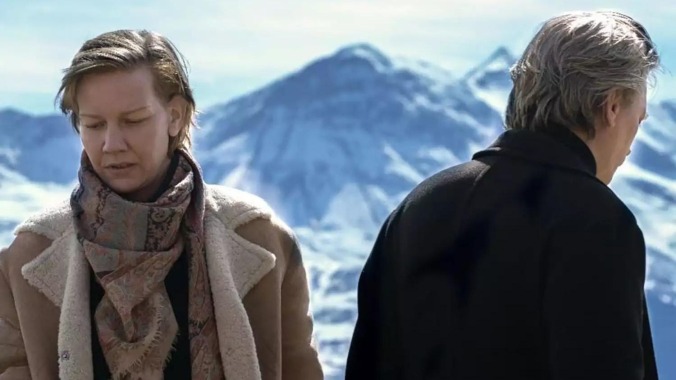Anatomy Of A Fall review: Palme d'Or winner dissects a death and a marriage
Director Justine Triet and star Sandra Hüller prove a courtroom procedural can be fresh and unique

There’s a gruesome, bloody death in the elongated opening of director/co-writer Justine Triet’s Anatomy Of A Fall that leads to the murder case at the center of the film. However, the French filmmaker and her co-writer Arthur Harari start setting the scene long before the titular tumble, ratcheting up the tension within the first few minutes when an awkward interview at the home of author Sandra Voyter (Sandra Hüller) is interrupted by a steel drum cover of 50 Cent’s “P.I.M.P” played at an abrasive volume. This brilliantly puts the audience on edge and that perfectly calibrated suspense is sustained throughout the picture, even in the courtroom setting that dominates the film—an impressive feat given that procedurals can be staid and aesthetically dull.
The German-born Sandra is an author whose novels blend reality and fiction. However, she’ll soon wish that her own reality were fiction. She’s recently settled into a remote mountaintop chalet in France, uprooting her life in London to move back to the hometown of her author/teacher husband Samuel (Samuel Theis) with their vision-impaired 11-year-old son Daniel (Milo Machado Graner) and good dog Snoop (Messi). But on a frigid winter day, everything changes for their family when Snoop and Daniel, who’d been out on a walk, discover Samuel’s dead body in the snow beneath the third-story window of their home.
What initially presents itself as an open-and-shut case of accidental death—Samuel becoming disoriented by the blasting music and slipping out the window while putting up insulation—develops into a homicide investigation as the blood splatter tells a different story. Making matters worse, the autopsy results are inconclusive. Sandra is fingered as the prime suspect since she was the only adult home at the time and she has no credible alibi. She knows she didn’t do it, but can’t fathom it’s suicide either as she assumes Samuel’s mindset was healthy and their marriage was in a good place. As the trial commences with her lawyer and friend Vincent (Swann Arlaud) by her side, new information comes to light that, once again, upends Sandra and Daniel’s worlds.
Triet and Harari thread the needle nicely, incorporating Sandra’s entire identity as something to scrutinize, like a modern-day witch trial. Her femininity, sexuality, domesticity, psychological profile, and career ambitions are all brought up to cast aspersions and establish motivations. Even her German heritage and British emigration are used to demonstrate a perceived rejection of the French people and language, and to paint her as non-smiling, unhappy, and unkind. There’s also a distinct undercurrent of sexism brought into the courtroom by the lead male prosecutor, who accuses her of the alleged crimes. The juxtaposition of both mother and child’s perspectives, bringing in Daniel’s observations and opinions, add to the ensuing suspense surrounding the events and interpersonal parent-child dynamic.






















![HBO teases new Euphoria, Larry David, and much more in 2026 sizzle reel [Updated]](https://img.pastemagazine.com/wp-content/avuploads/2025/12/12100344/MixCollage-12-Dec-2025-09-56-AM-9137.jpg)

















